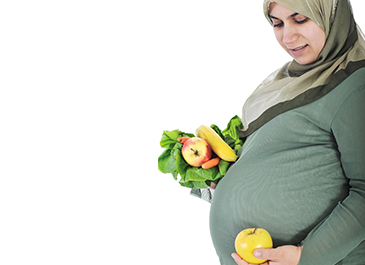From the moment a baby is born, a mother’s life is devoted to providing the best for her child. However, the sacrifices a mother makes for her child start well before birth. During pregnancy, all of the nutrients in a mother’s body are consumed to support the healthy development of a baby. Studies suggest that even when taking a multivitamin, pregnant women may still lack many of the key nutrients required for a an optimal pregnancy. These nutrient deficiencies can compromise the health of not only the baby but also the mother. There are several key nutrients that are necessary to ensure the health of both mother and baby.
Folic Acid
As a B-vitamin, folic acid performs a number of bodily functions; supporting the growth and development of a baby is just one. Folic acid promotes the proper formation of a baby’s brain, spine and skull and plays a vital role in preventing neural tube disorders such as spina bifida. If you are relying on your prenatal multivitamin to supply you with folic acid, check to make sure it contains 400-800mcg per daily dose. You may even consider taking a folic acid supplement in addition to your prenatal multivitamin to ensure your body has a sufficient amount of folic acid. It is also important to incorporate folic acid into your diet by eating leafy green vegetables, legumes and whole grains.
Essential Fatty Acids
Mom was right: fish is brain food. The central nervous system in humans, including the brain, is partly composed of DHA, a fatty acid derived from fish oils. Even though DHA is a vital brain-building nutrient, most pregnant women don’t incorporate the required amount of DHA into their diet. By maintaining adequate levels of fatty acids, you can reduce the risk of high blood pressure and hypertension, which can occur during the later stages of pregnancy. It has also been revealed through studies that mothers who took DHA supplements during pregnancy and breastfeeding had children who tested higher on IQ tests than those children whose mothers did not. The most effective way to boost your fatty acid stores is to incorporate a high-quality fish oil into your diet. However, it’s important to choose a fish oil free of heavy-metal contaminants such as mercury. In addition to taking a fish oil supplement you can also introduce salmon, tuna, halibut, mackerel, pollock, haddock and/or cod into your diet. When eating fish you should limit your intake to once a week or even once a month to avoid high mercury levels. Vegetarian moms can derive the precursor for DHA from Omega-3 rich vegetable sources like flax or walnut.
Iron
If you are experiencing weakness, fatigue and dizziness it may indicate your iron stores are depleted. Iron is critical for red blood cell production and helps sustain a healthy metabolism. With the high metabolic demands of growing a baby, adding supplements to your diet may be necessary to increase and maintain iron levels. For some women, iron supplements can often trigger uncomfortable symptoms such as constipation. For those requiring iron supplements, ferrous gluconate is a type of iron supplement that is easier to withstand. If iron supplements prove to be too hard on your system try getting your iron from poultry, meat and fish.
Boosting the levels of these key nutrients before they are in high demand during pregnancy, can build up the body reserves and reduce the risk of serious health conditions. Some experts suggest taking a high-quality prenatal multivitamin with folic acid at least three months before conception. The end result of optimal nutrition is a healthier pregnancy and, ultimately, a healthier child.
Dr. Brian Gluvic is a Naturopathic Physician at the Village Health Clinic in Surrey, which offers naturopathic medical and midwifery care. For a consultation with Dr. Gluvic please call 604-575-7275. For more information, visit www.villagehealthclinic.ca.

